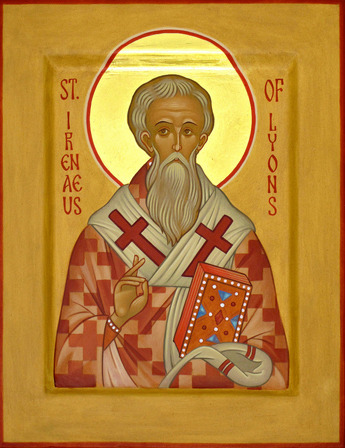 HOMILY for the Memorial of St Irenaeus of Lyons
HOMILY for the Memorial of St Irenaeus of Lyons
2 Kings 24:8-17; Ps 78; Matt 7:21-29
In every Mass we pray after the Our Father for “peace and unity” to be granted to God’s holy Church, and today we celebrate a saint and martyr whose life was devoted to safeguarding the unity and peace of the Church. In this way, he was true to his name, Irenaeus, which means ‘peace’.
Born around 135-40 in Smyrna, which is now called Izmir in Turkey, Irenaeus was mentored by bishop Polycarp, a disciple of the apostle St John. By 177 he had moved to Lyons in Gaul, where he is one of the priests ministering to the Greek-speaking Christian community there. That community sent him to Rome to take a letter to the pope, and while he was in Rome, the church in Lyons was attacked by Marcus Aurelius. 48 were martyred including the bishop. So, when Irenaeus returned to Lyons he was appointed bishop, and he taught the Faith, and defended it against the Gnosticism – a dualist heresy that set a good spiritual God against a negative Principle that produced all matter, that was thus, evil, in the world. The Gnostics believed that Jesus was sent to liberate Man from matter, setting his spirit free, but this superior and secret knowledge (gnosis) was only given to some Christians called the spirituals. This heresy was prevalent throughout the 2nd century and it divided the Church. These dualistic ideas probably sound familiar since versions of it crop up repeatedly, and St Dominic and his Order arose to respond to the 13th-century version of it called Catharism. So, St Irenaeus arose in the 2nd century to counteract Gnosticism, and he laboured until his death around 202-3 during another wave of persecution by the Emperor Septimus Severus.
Given the violence and persecution in Irenaeus’ lifetime and his own martyrdom, evidently, the peace that he is credited with bringing to the Church is not temporal peace. Rather, it is a peace that comes from being built upon the rock that is our one true Faith in Jesus Christ. As bishop and teacher of this Faith, then, St Irenaeus defended the people of God from the violence and divisiveness of heretical ideas, and united the Church in Lyons to the wider Church of his mentor St Polycarp: the Church of St John and the apostles, who, unlike the Gnostics, openly taught the common faith and knowledge of salvation that comes from Jesus Christ. So, in an unbroken line, the Apostolic Fathers taught with Christ’s authority, and their successors continue to do so today.
As St Irenaeus wrote in his book, Against Heresies, “The Church, though dispersed throughout the world… having received [this faith from the Apostles]… as if occupying but one house, carefully preserves it. She also believes these points [of doctrine] just as if she had but one soul and one and the same heart, and she proclaims them, and teaches them and hands them down with perfect harmony as if she possessed only one mouth. For, although the languages of the world are dissimilar, yet the import of the tradition is one and the same. For the Churches which have been planted in Germany do not believe or hand down anything different, nor do those in Spain, nor those in Gaul, nor those in the East, nor those in Egypt, nor those in Libya, nor those which have been established in the central regions of the world” (1, 10, 1-2).
It is this unity and peace, coming from an adherence to the one Faith in the one Lord that we pray for in the Mass. For it is this unity and peace that is signified when we receive the one Bread and the one Cup that makes us “one body, one spirit in Christ”.
acatholicvibe liked this
lawrenceop posted this